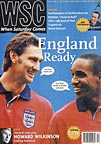 Italy have tried the idea of two referees. Richard Mason tells us why he is impressed
Italy have tried the idea of two referees. Richard Mason tells us why he is impressed
The second round, first leg matches of the Italian Cup, played on October 12-14, saw the start of an experiment that could have far-reaching consequences. For the first time in an important competition in Europe, matches were controlled by two referees.
Each referee controlled one half of the field and stationed himself on the side opposite the linesman. He controlled the same half for the whole game. However, in situations such as corners and free-kicks involving a wall, or penalties, both referees were involved. For example, one would organise the wall while the other checked for off-the-ball incidents. Either referee could whistle for a foul in the other referee’s half if he had a better view of the incident .
The last of the eight games chosen was Atalanta v Torino, for which the referees were the two biggest names in Italy. The perennially bronzed Graziano Cesari is a laid-back sort of character – so laid-back that he is currently in trouble after being found smoking in the dressing-room during the interval of a European game. Alongside him was the current “king of the black jackets”, Pierluigi Collina. Once I would have said that if there was such a thing as a fundamentalist referee, it was Collina, but he has become more human recently. Even so, players don’t mess about with him and his technical ability has never been in question.
At first, it was strange to see two referees on the field, but gradually it became clear that they made an excellent pair. Collina seemed to take more decisions, possibly because of his strong personality, and to stray more from his position. But this was because in the first half he was in Atalanta’s half and nearly all the play was in Torino’s (even though they were winning 1-0). In the second half, when Atalanta continued to dominate and took a 3-1 lead, it was Cesari who had to move more to be involved.
Neither referee made a serious mistake. Three Torino players were rightly booked, all by Cesari, one for time-wasting and two for dissent. Collina was perfectly positioned to award Atalanta a clear penalty, as was Cesari in the first half when he correctly denied an Atalanta claim.
The reaction from the media, players and coaches has been generally favourable. For Atalanta v Torino, Gazzetta dello Sport gave Cesari seven (very good) and Collina eight (near perfect). In only one match did one referee overrule the other – a free-kick for a goalkeeper handling a back-pass was changed to a drop-ball when the second referee pointed out that the ball had been chested, not kicked.
Pescara coach Giovanni Galeone said he was not conservative about anything except football, and had viewed the experiment with scepticism. After seeing it action, however, he had changed his mind. Some players were a little less enthusiastic, but the impression was that overall behaviour at the eight matches was above average, with fewer cards and less dissent.
Interviewed by Gazetta dello Sport, Collina was asked to name one advantage and one disadvantage. He said the advantage was that he was nearly always very close to the incidents he had to decide on, while the disadvantage was that he spent 70 per cent of his time running backwards. Asked about uniformity of interpretation, he said that if two referees became the norm, they would have to learn to work as teams – there would be no room for personalised interpretations.
Personally, I was not really in favour beforehand, believing that it would simply lead to “trial by media” of two referees instead of one, and one match is not enough to definitely change my mind. However, I think next season it should be tried throughout a major competition, because, with the best will in the world, the cup is not taken very seriously here. That competition should be Serie A, since it is Serie A clubs who make the most noise about alleged bad refereeing. Two referees worked perfectly in Atalanta v Torino: now let’s see them handle Milan v Inter or Lazio v Roma with the scudetto at stake.
Anything is worth trying if it avoids such things as the slow motion replay to decide controversial incidents. Trying to operate as one of a pair and not as a kind of demi-god might even be good for a certain type of referee – Elleray, shall we say? – and so for the game as a whole.
From WSC 154 December 1999. What was happening this month